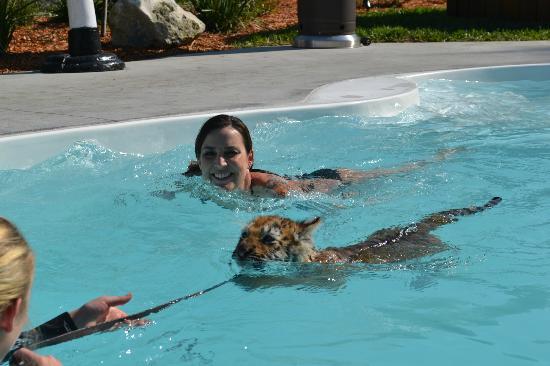Interaction - Swimming with tigers

Some American zoos are offering a new and "original" way to interact with wild animals: swimming with tiger cubs and other big cats.
According to the owners of these centers, this kind of interactions helps socialize the cubs at get them used to humans.
These swims set out a series of well-being and ethical concerns such as:
* The cubs should not be in touch with the public because being less than 8 weeks old, their immune system is not fully developed.
* Only animals under a year are used, because as they get older and stronger they can also get aggressive or dangerous. This "time limit" has raised serious questions concerning the animals' whereabouts. The final destination of the tigers that are no longer profitable for these centers are generally unknown. According to TRAFFIC, they may end up being used to produce traditional Asian medicine.
* To maintain this business (200€ per session) there is a constant need for cubs, which means that the tigers are constantly forced to breed.
* The separation from their mothers, the constant handling and the forced interactions may cause stress and seriously harm the animals. (watch some cubs' reactions in this and this video).
* To avoid big cats hurting people with their big and sharp claws, it's already a common practice in this kind of business to remove the animals' claws in a brutal and painful manner called "declawing". Generally, the tigers are also sedated to keep them docile and easy to handle. (More information here: http://turismo-responsable.com/s15)
Some of the centers that offer these activities advertise themselves with tricky adjectives such as "sanctuaries" or "eco zoos". Adjectives that may cause misunderstandings leading people to think they are participating in activities preserving and protecting tigers and not exploiting them which is what they actually do. One of these centres, the Dade City's Wild Things, in Florida, invites tourists to become "trainers for a day", nursing and swimming with the cubs for half an hour. They also offer the opportunity to swim with rabbits, monkeys and alligators (these last ones with their snouts sealed to protect tourists).
This type of centers accept donations. Taking into account that genuine rescue centers would never offer these activities, our advice to everyone who might be thinking about helping animals during their holidays, is to check the next link about how to distinguish real rescue centers from those who exploit and seek personal benefits. (http://turismo-responsable.com/s32 )
Another center that offer swimming opportunities with tigers, acts under the pretentious name of The Institute of Greatly Endangered and Rare Species (T.I.G.E.R.S) and is based in Myrtle Beach, South Carolina. Their director has been investigated and fined repeatedly, due to violation of animal protection laws. He exploits animals for any type of lucrative activity: renting them for shootings and shows and using them in many different ways to interact with visitors (photo- props opportunities, cuddle sessions and swimming with their cubs). For more info click here.
Translation: Iván Arias Rubio
Foto: TripAdvisor
